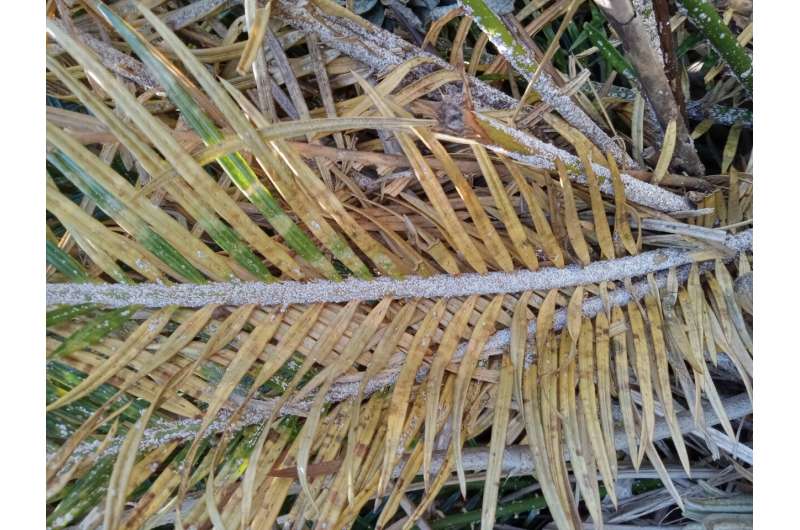This article has been reviewed according to Science X's editorial process and policies. Editors have highlighted the following attributes while ensuring the content's credibility:
fact-checked
trusted source
proofread
Invasive insect herbivore alters ecosystem services delivered by cycads

A study published in the June 2024 issue of the journal Pedosphere looks at how a non-native armored scale insect alters the leaf litter decomposition dynamics of the novel host cycad species on newly invaded islands. The scale insect, known as cycad aulacaspis scale, or CAS, has been invading new territories around the globe for decades, killing the resident cultivated and natural cycad populations.
Non-native insect herbivores that invade island communities often threaten native plants that serve as newly discovered hosts. The scientific community often quantifies plant mortality following these island invasions, but the cascading ecosystem responses are often not considered in conservation research.
The invasion that triggered the biogeochemistry study was the 2003 invasion of Guam, where the resident native cycad population was threatened.
"We documented the onset of CAS-induced mortality among the native cycad plants as early as 2005," said author Thomas Marler, retired professor with the University of Guam. "In response, the international coalition of cycad specialists began communicating impassioned recommendations for building a coalition of biological control organisms to control Guam's CAS population."
As the years of plant mortality accrued, the host plant known as Cycas micronesica was ultimately listed under the U.S. Endangered Species Act (ESA) as a result of the ongoing mortality.
"Yet to our dismay, the empowered decision-makers never adequately focused on the required steps for establishing biological control of CAS," Marler said.
As a result, the Plant Physiology Laboratory within the university's Western Pacific Tropical Research Center embarked on a series of studies designed to more fully understand the ecosystem-level damage that follows the invasion of an island community by CAS. The ultimate goal was to generate new knowledge to inform how the loss of cycad populations can alter ecosystem-level dynamics in island settings.
The Guam research team used traditional litter decomposition protocols to compare decomposition dynamics of cycad leaves that were damaged by CAS versus cycad leaves that remained undamaged.
Approximately one year of litter incubations revealed that CAS damage greatly increased the speed of leaf decomposition, including the speed with which macronutrients were released from the litter to the bulk soil. For example, the nitrogen contained within the undamaged litter was triple that contained within the CAS-damaged litter at the end of the study.
"We also wanted to expand the scope of the study to determine if litter decomposition of other cycad species was influenced by CAS damage," Marler said. "The logistical constraints of conducting research on Guam were becoming inhibitory as a result of the ESA-listing, so we augmented the first study with a study in the University of Guam's cycad germplasm collection in the Philippines."
The Philippine study compared litter decomposition of six cycad species and the results corroborated what was learned from the Guam study. After about one year of decomposition, the undamaged leaf litter that remained in the incubation chambers was at least double that of the CAS-damaged leaf litter.
The Guam case study confirms that a new CAS invasion of an island ecosystem requires conservationists to act rapidly to establish biological control because inadequate action allows the CAS to cause ecosystem-level damage.
"Indeed, one of the ecosystem services that cycad plants offer to their communities is the production of slowly decomposing leaf litter, which scientists call recalcitrant because carbon and other nutrients are sequestered in the cycad litter for lengthy periods of time," Marler said. "We have shown that this ecosystem service is damaged by chronic CAS herbivory."
More information: Thomas E. Marler, Aulacaspis yasumatsui infestations accelerate Cycas leaf litter decomposition and nutrient release, Pedosphere (2023). DOI: 10.1016/j.pedsph.2023.04.007
Provided by University of Guam



















